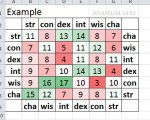Well, in my reply to @
ExploderWizard I said it was harsh to say of those who (want to) depart from Gygax's mechanical procedures that they "want to play D&D the brand but actually don't care for D&D the game". And I gave myself as an example: I want to, and do, depart from Gygax's mechanical procedures; I don't feel any strong pull to D&D
the brand, having spent nearly two-third of my RPGing life GMing Rolemaster; but I certainly regard myself as caring for D&D the game. It's just that, for me, D&D the game is not primarily a set of mechanical procedures (Gygax's or anyone else's) but a set of story elements: multi-racial, often Tolkienesque, groups of characters; party play; starting out opposed to bandits and goblins and other comparatively low-scale threats that are harbingers of something greater, and then finishing up facing down archmages or demon lords or similar worldscale foes; violent combat as a pre-eminent site of conflict resolution (and melee combat as pre-eminent compared to ranged combat); etc.
Thus, when I was GMing Rolemaster, a great deal of the story material that I used - world descriptions, scenario ideas, creature descriptions, etc - were taken from D&D sources (both AD&D and 3E/d20). Now that I am GMing 4e - having formed the view that it is better than Rolemaster for RPGing with those story elements in the sort of way that I want to - I still use story material from a wide range of editions: I've used elements of several 4e modules, the B/X module "Night's Dark Terror", the AD&D classic D2, the 3E module Speaker in Dreams, and the d20 module Wonders Out Of Time. From memory I don't think I've used any non-D&D material, although I have made notes for using the example scenario The Red Grove from the HeroWars Narrator's Book, and it's still possible (although increasingly unlikely) that that might come into the game.
Anyway, that's an attempt to explain what I mean by "story elements", and to explain why I see D&D as constituted just as much, if not more, by those things than by its mechanical procedures. And I was wondering if you would characterise that as "wanting to play D&D the brand while not actually caring for D&D the game". I've tried to explain why I
wouldn't characterise myself in that way.

